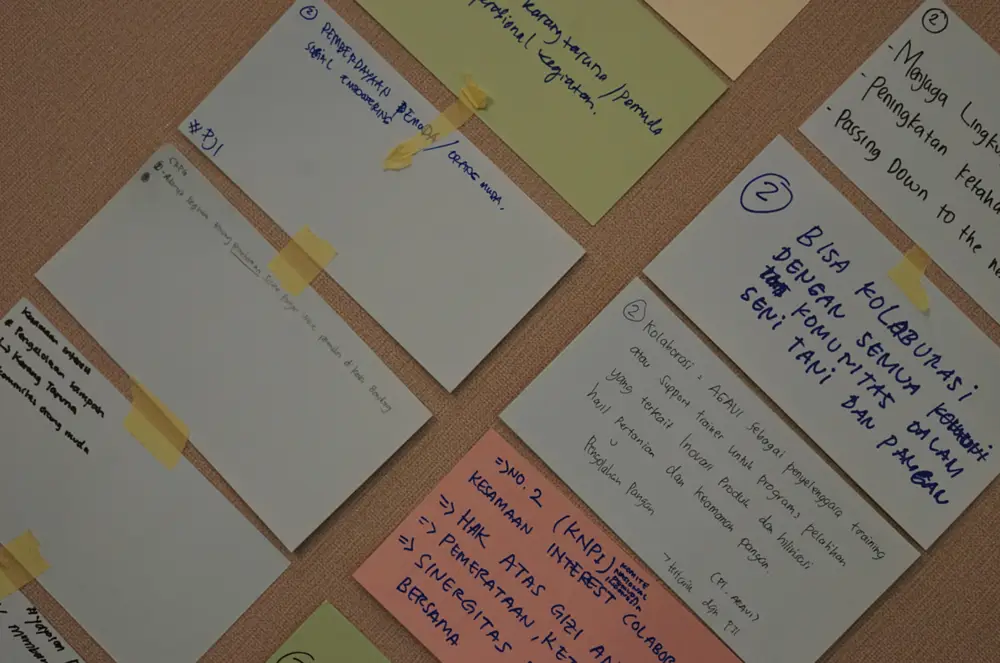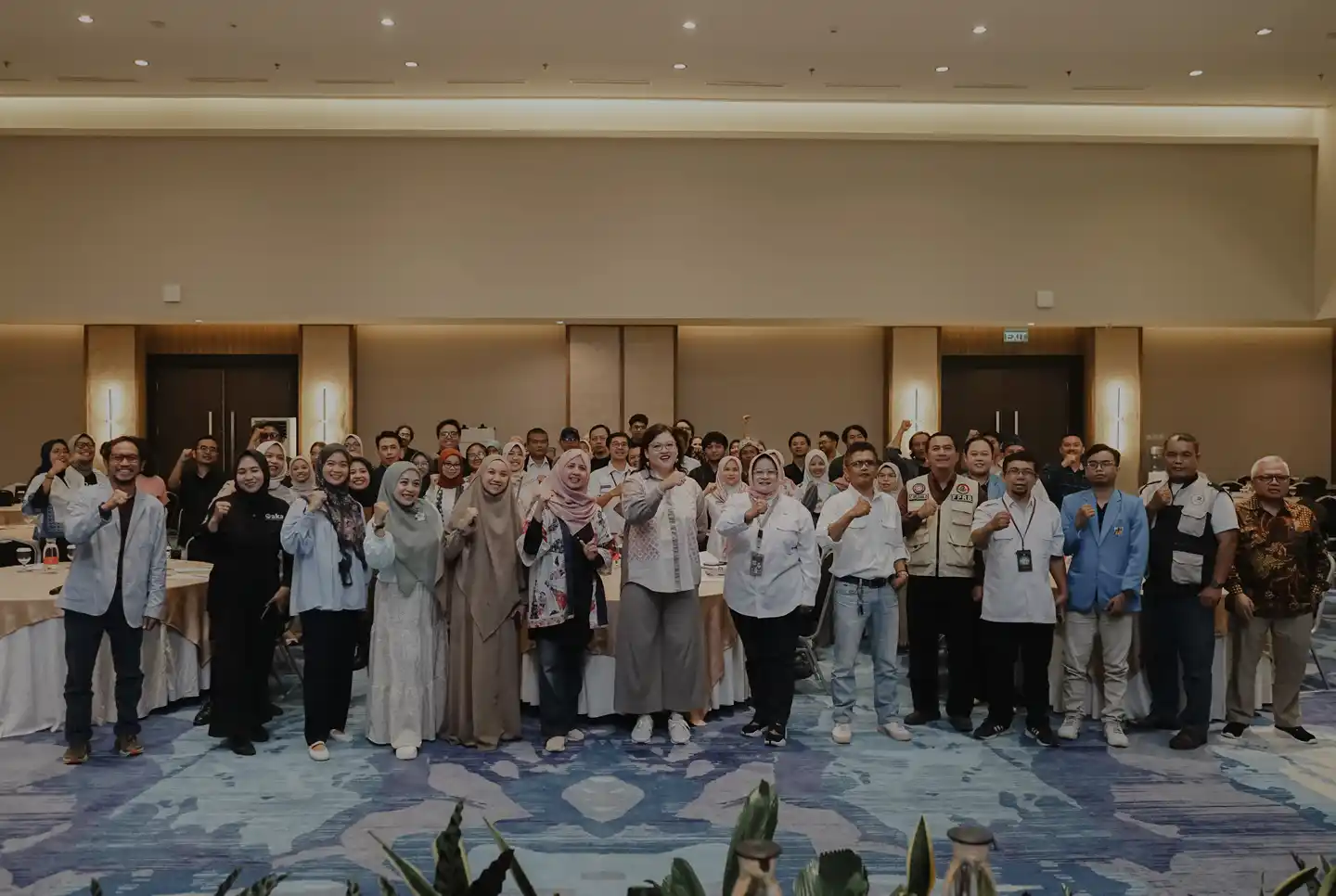List of contents
Urban Futures (UF) is a 5-year global program (2023–2027) that combines urban food systems, youth well-being, and climate action. In Indonesia, the program is managed by the Humanis and Social Innovation Foundation (Humanis) and implemented in two cities, namely Bandung and West Manggarai. Related to the involvement of various key stakeholders in the Bandung city food system, the Urban Futures program has organized 2 (two) major activities, namely the Bandung City Food System Theory of Change Development Workshop in October 2023 and the official launch of the Urban Futures program in Bandung City in March 2024.
In the workshop, each stakeholder was invited to identify key issues in the local food system related to climate change using the Theory of Change. The parties were invited to work together to formulate various forms of strategic interventions, both in the production, distribution, and consumption sectors of food. The focus of this workshop was to design an action plan that could support climate change mitigation and adaptation while strengthening urban food security. Meanwhile, in the official launch (KickOff) of the program which marked the start of the implementation process at the local level, key stakeholders were again invited to actively participate in each stage of the process. The goal is to create synergy and collaboration among all stakeholders, so that each intervention that has been previously designed can be implemented effectively and in an integrated manner. In both of these activities, the Urban Futures Program has actively involved key stakeholders in the Bandung City food system, including various agencies of the Bandung City Government.
Introductory Presentation
Before entering into the discussion regarding the Bandung City Multi-Stakeholder Forum, we will first present the results of research that has been conducted regarding the Bandung City food system.
Research Questions and Answers
1. Anything main problem in the food system of Bandung City? Especially the subsystem distribution?
Based on the research results, several main problems of the food system in the distribution subsystem are the instability of food prices, the absence of a food buffer institution that acts as a distribution center that serves as a point for maintaining market price stability and managing food availability in the city of Bandung, and a long distribution pattern that results in high food losses and waste.
In the distribution subsystem, the length of the food supply chain makes the carbon footprint of food and agricultural products available in Bandung City high. With a long distribution pattern, it results in high food loss and waste, coupled with poor management of organic waste in distribution areas (such as markets) which is a contributor to GHG emissions.
2. How are the dynamics of the Bandung Food System related to climate change?
3. What is the intervention? strategic and quick-win from local government?
In the distribution subsystem Building a city-level food buffer institution (such as BULOG), can maintain price fluctuations and better food distribution. This can also be done by adding the duties and functions of the regional public company PD Pasar Juara.
With the Stakeholder Analysis Methodology, Media Mapping, Expert Interviews and Snowball Sampling, the interim results of actor mapping on the issue of climate change and food systems are as many as 155 actors. With details 28 government agencies, 88 community organizations, 25 business entities, 10 academics, And 4 media.
4. (How) Mapping of Bandung Food System Actors & Need for Multi-Stakeholder Forum?

Bandung City Food System Action Plan
In this discussion forum, participants were divided into three groups based on their interest in the three major issues raised, namely: (1) Validation of problems, challenges and solutions of the Bandung City Food System and advocacy targets regarding the food system in Regional Regulation (PERDA) No. 3 of 2024. (2) Mapping the Means of Communication and Multi-Party Collaboration in the Bandung City Food System. (3) Mapping youth collaboration related to Bandung City Food System.
Discussion & Solutions
For approximately 30 minutes, participants discussed the chosen topic and the following are the results of the group discussions that were conducted.
Discussion 1:
Validation of problems, challenges and solutions of Bandung City Food System
Based on the results of the discussion, participants provided several alternative solutions, including:
- Intense and consistent coordination with related institutions is required.
- The Sae hunting group can help a little in solving the problems of stunting and food security at the community/micro level.
- Scale-up maggot fly farming business for organic waste problems.
- Bulog has prepared almost 3000 tons of rice in the West Java region.
- Food barns must be built immediately around the area / food hub for storing food reserves.
- Providing incentives for production land that maintains sustainable functions.
- Create a distribution warehouse system.
- Create emergency rules in disaster.
Discussion 2:
Mapping Communication Facilities and Multi-Party Collaboration in the Bandung City Food System
- 80% Bandung residents get information from social media, so social media platforms are considered very effective as a means of collaboration.
- In the city of Bandung there is also something called a super admin, where we unite all WhatsApp groups.
- Can be through community forums → MoU between institutions Routine in holding forums: this forum must be held once a month, or once every 3-4 months in a year. Can meet more casually in the park, or online.
Discussion 2:
Mapping youth collaboration on Bandung City Food System
Collaboration that can be done between organizations such as creating a Youth movement that cares about the environment and the food system, forming a platform that supports the food system as a whole and having routine activities related to the food system especially for young people. To realize all of that, Matchmaking, training, mentoring, and assistance are needed. Where these activities are carried out to support the division of roles.
This article is quoted from the report of the Bandung City Food System Multi-Stakeholder Forum, which can be downloaded in PDF format:



